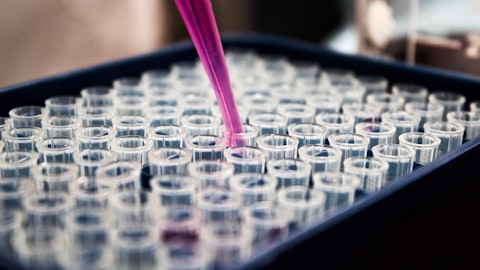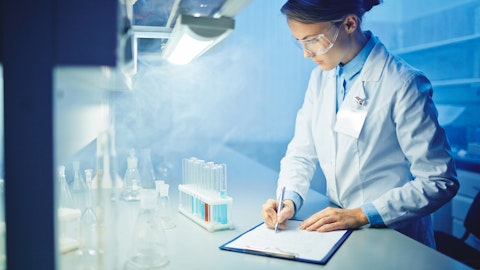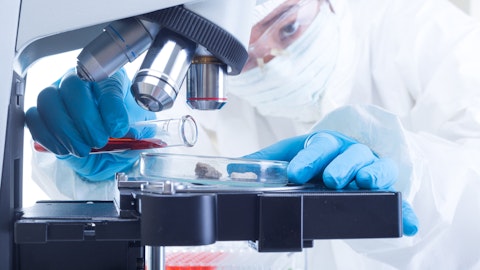PDS Biotechnology Corporation (NASDAQ:PDSB) Q4 2023 Earnings Call Transcript March 27, 2024
PDS Biotechnology Corporation isn’t one of the 30 most popular stocks among hedge funds at the end of the third quarter (see the details here).
Operator: Good morning. And welcome to PDS Biotech’s call to discuss the company’s Year-End 2023 Financial Results and Clinical Strategy Update Conference Call. All participants are currently in listen-only mode. Following the formal presentation, we’ll open up the call for question and answer session. I would now like to turn the conference over to Tom Johnson of LifeSci Advisors. Please go ahead, sir.
Tom Johnson: Thank you, operator. And good morning, everyone. And welcome to PDS Biotech’s 2023 year-end results and clinical strategy update call. Today, we will discuss financial results for the year-end of December 31, 2023, and provide a business and clinical programs update. This morning, the company issued a press release with these results, which can be found under the Investor Relations Section of the PDS Biotech website. I am joined on the call today by the following members of the company’s management team, Dr. Frank Bedu-Addo, Chief Executive Officer; Lars Boesgaard, Chief Financial Officer; and Dr. Kirk Shepard, Chief Medical Officer. Dr. Bedu-Addo will begin with the corporate and clinical programs update, and then Mr. Boesgaard will review financial results for 2023.
Following the company’s prepared remarks, Dr. Shepard will join the call to help address questions from covering analysts. As a reminder, during this call we will be making forward-looking statements, which are subject to various risks and uncertainties that could cause actual results to differ materially from these statements. Any such statements should be considered in conjunction with the cautionary statements in our press releases and risk factors discussed in our filings with the SEC, including our Quarterly Reports on Form 10-Q and Annual Report on Form 10-K, and cautionary statements made during this call. We assume no obligation to update any of these forward-looking statements or information. Now I’d like to turn the call over to Dr. Bedu-Addo.
Frank?
Dr. Frank Bedu-Addo : Thank you, Tom. And good morning, everyone. I am pleased to be speaking with all of you today and to be joined by two new members of the PDS Biotech Leadership Team. Lars Boesgaard joined us last November as Chief Financial Officer. He is an experienced CFO with an impressive track record of guiding biotech companies to create strategic growth. We welcome his insights, as well as his financial expertise and oversight, as we continue to mature our business and advance our clinical programs. In January of 2024, we also announced the appointment of Dr. Kirk Shepard. Kirk is a distinguished Board-Certified Medical Oncologist and Hematologist with more than 30 years of experience in the pharmaceutical industry.
Most recently, Kirk was Chief Medical Officer, Senior Vice President, and Head of the Global Medical Affairs Oncology Business Group at Eisai. We are particularly pleased to have Kirk on board, as his wealth of oncology and clinical expertise will be invaluable as we begin to execute the updated clinical development strategy we will be discussing today. As Tom mentioned, Lars will walk you through our financial results for 2023 later on the call, and Kirk will be available to take questions during the Q&A session. So let’s begin. Our fourth quarter of 2023 and recent weeks have been a busy and productive period for PDS Biotech, during which we made significant advancements with our PDS01ADC, our IL-12 Fused Antibody Drug Conjugate Clinical Programs, as well as our PDS0101 Phase 2 programs.
Over this period, compelling data from several Phase 2 trials became available. This includes long-term survival data from the National Cancer Institute led triple combination trials of PDS01ADC in combination with Versamune HPV formally known as PDS0101 and an investigational immune checkpoint inhibitor or ICI. We also obtained data from our own VERSATILE-002 study, of Versamune HPV and KEYTRUDA. Collectively, these data have provided us with clarity regarding how our drug platform technology works in advanced cancer and have informed the strategic decision we announced today to advance this triple combination of Versamune HPV, PDS01ADC, and KEYTRUDA in recurrent and or metastatic head and neck cancer, also referred to as head and neck squamous cell cancer, or HNSCC.
This program will be our top clinical development priority in place of the previously planned VERSATILE-003 trial. This decision enables us to focus our resources on a regimen which we believe has the highest potential benefit to patients with head and neck cancer and the potential to drive shareholder value. On today’s call, we will walk you through the data that has driven this decision, discuss the careful vetting we’ve undertaken to confirm our approach, and outline the advanced preparations on trial design and regulatory engagement we’ve already begun. To set the stage, I’ll first review the critical limitations that remain in the use of immunotherapies to treat solid tumors. First, the innate or acquired resistance these tumors have to immunotherapies, including immune checkpoint inhibitors, or ICIs, and CDA T-cells approaches.
These approaches all rely on activating T-cells to attack the cancer. They therefore attack the cancer from the outside. However, most advanced solid tumors house their protection against the immune system in their inner core. These tumors can therefore prevent T-cells from recognizing or infiltrating the tumor. In addition, these tumors may be able to inactivate any infiltrating T-cells due to the presence of suppressive cytokines or inhibitory factors within the tumor. The second important limitation is that current immunotherapies have not demonstrated the ability to generate the right type and quantity of effective tumor infiltrating and tumor killing T-cells, unlike what we have demonstrated with our Versamune platform to date. Recent long-term survival results and clinical data provide clarity on the dual mechanism of action of combining PDS01ADC and Versamune and its potential to overcome most critical immuno-oncology limitations.
The insights into the PDS01ADC mechanism of action provided by this recent data clarify the potential of this drug therapy in combination with Versamune HPV and an immune checkpoint inhibitor. PDS01ADC utilizes an antibody that binds to DNA found in the inner core of the tumor and therefore delivers the IL-12 into the internal compartment of the tumor. The IL-12, once within the tumor, limits the presence of inhibitory factors within the tumor, thereby weakening the tumor’s defenses against the immune system. Versamune HPV simultaneously generates a powerful T-cell attack on the exposed or less protected tumor, resulting in compelling anti-tumor responses, which we will discuss shortly. The data show that with this combination, the mechanism uniquely acts on both the inside and outside of the tumor.

Data was announced last November from the Phase 2 National Cancer Institute led triple combination trial for the treatment of recurrent and/or metastatic HPV16+, ICI-naive, and ICI-resistant cancers. This included head and neck cancer among other tumor types and provided proof-of-concept of the mechanism of action and support for prioritizing the triple combination. In the ICI-resistant group, the 12-month overall survival rate was 72%, and the median overall survival was approximately 20 months. With current approaches, the 12-month overall survival rate in HPV-positive, ICI-resistant cancer is approximately 30%, and median overall survival is only 3.4 months. A 63% overall response rate, or ORR, was observed in patients with the optimal dose of PDS01ADC.
Published data to date suggests ORR of less than 20% in ICI-resistant HPV-positive head and neck cancer. In the ICI-naive group, 75% of patients remain alive at 36 months, and therefore, the median overall survival was not reached. With immune checkpoint inhibitors, published results show a 36-month survival rate of approximately 20%. Overall response rate of 75% was seen in patients treated with the triple combination, with a complete response rate of 38%. Published ORR of less than 40% is seen with immunotherapeutic agents. With the triple combination, responses were seen in all HPV-positive tumor types. These data are further supported by our robust clinical data set in over 430 patients treated with either Versamune HPV or PDS01ADC, or the combination, including over 110 head and neck cancer patients to date.
Importantly, with respect to safety, we have seen acceptable tolerability in over 300 patients treated with PDS01ADC, and in over 170 patients with Versamune HPV to date. Additionally, the National Cancer Institute has completed a detailed dose optimization study for PDS01ADC based on safety and clinical response, which is a critical consideration for the FDA. This large database of patients provides a robust clinical data set that validates the potential efficacy and safety of our platforms, which we believe, supports our decision to prioritize our Versamune PDS01ADC platform in combination with KEYTRUDA. Based on the totality of data generated to date from VERSATILE-002 and the National Cancer Institute-led triple combination study, our triple combination trial to be progressed will therefore consist of Versamune HPV, PDS01ADC, and KEYTRUDA.
We engaged the FDA regarding our decision, and the FDA has provided clear guidance on clinical study design and regulatory pathway for the triple combination. We also engaged with top U.S. and EU key opinion leaders to confirm interest in the triple combination and participation in a clinical trial. We are pleased to announce that Dr. Katharine Price of Mayo Clinic, who is also an investigator on the VERSATILE-002 trial, will be the lead investigator in the planned pivotal trial of the triple combination. We are also conducting rigorous evaluation of the competitive landscape in both ICI-naive and ICI-resistant head and neck cancer. This careful research takes time, but we are taking the necessary steps to ensure that our decision is in the best interest of patients and our shareholders.
We intend to move strategically and aggressively to advance the triple combination into a pivotal trial. By initially addressing the rapidly growing unmet medical need in recurrent metastatic HPV-16 positive head and neck cancer, we strongly believe that this approach has the potential to rapidly establish the combination of PDS01ADC and Versamune as a transformative oncology platform. The data suggests that the triple combination may result in a significant improvement in overall survival rates for patients who currently lack an effective treatment option. We are deeply grateful to our patients who participate in our trials and to our collaborators who continue to show immense confidence in our platforms and who have been instrumental in working with PDS Biotech to achieve what we now believe are potential significant advances in cancer treatment.
With that, I will turn it over to Lars for a review of our financial results. Lars?
Lars Boesgaard : Thanks, Frank. And good morning, everyone. I look forward to engaging with you as we advance the clinical program that Frank has just presented. Turning to our financial results, net loss for the year ended December 31, 2023 was approximately $42.9 million, or $1.39 per basic and diluted share, compared to a net loss of $40.9 million, or $1.43 per basic share and diluted share, for the year ended December 31, 2022. The higher net loss was primarily the result of increased operating loss and increased net interest expense. Our research and development expense for the year ended December 31, 2023 decreased to $27.8 million compared to $29.4 million for the year ended December 31, 2022. The decrease of $1.7 million was primarily attributable to the $10 million purchase of the rights to PDS01ADC in 2022, partially offset by an increase in clinical costs of $6.1 million and an increase in personnel costs of $2.1 million.
As a reminder, we entered into an exclusive worldwide license for PDS01ADC in late 2022 for consideration of $5 million in cash and $5 million in company shares. General and administrative expenses for the year ended December 31, 2023 increased to $15.3 million compared to $12.2 million for the year ended December 31, 2022. The $3.1 million increase was primarily attributable to an increase in personnel costs of $1.5 million and an increase in professional fees of $1.6 million. Total operating expenses for the year ended December 31, 2023 were $43 million, an increase of approximately 3.3% compared to $41.7 million in total operating expenses for the year ended December 31, 2022. Net interest expense increased to $1.3 million for the year ended December 31, 2023 compared to $0.4 million for the year ended December 31, 2022.
This change was due to higher interest rate, interest expense related to the company’s notes payable, which was partially offset by higher interest income on our bank deposits. During the fourth quarter of 2023, we raised approximately $10.5 million in net proceeds from our at-the-market sales agreement. In conclusion, our cash balance as of December 31, 2023 was $56.6 million. Our annual report, which will be filed within a few days, will contain a growing concern and opinion, reflecting substantial doubt about our ability to meet our obligations for 12 months following the filing of the annual report. Based on our currently available cash resources and cash flow projections, we believe that without commencing a pivotal clinical trial and without our notes payable being called by the lenders, our current cash balance is sufficient to fund our operations and research and development programs into the fourth quarter of 2025.
With that, I’ll turn the call over to the operator for our Q&A session.
See also 15 Affordable Hidden Gem Southern Cities to Retire In and 15 Best Places in Alabama for a Couple to Live on Only Social Security.
Q&A Session
Follow Pds Biotechnology Corp (NASDAQ:PDSB)
Follow Pds Biotechnology Corp (NASDAQ:PDSB)
Receive real-time insider trading and news alerts
Operator: Thank you. [Operator Instructions]. One moment please while we poll for questions. Thank you. Thank you. And our first question will be coming from the line of Louise Chen with Cantor Fitzgerald. Please receive your question.
Carvey Leung: Hi, good morning everyone. This is Carvey on for Louise Chen from Cantor. Thank you for taking our questions. Our first question is, given you’re prioritizing PDS01ADC triple combo study over VERSATILE-003, how are you thinking OpEx management differently for the rest of the year as a result of the switch? And secondly, as we’re thinking about the rest of this year and into 2025, what are your biggest milestones or data readouts in the next 12 to 18 months? Thank you so much.
Dr. Frank Bedu-Addo: Hi, Carvey. Thanks for that question. Could you please go over the first one again? I lost the last part of the first question.
Carvey Leung: Yes. Essentially, we are asking about, since you guys are prioritizing the ADC triple combo over VERSATILE-003, how are you guys thinking about OpEx differently, or is it going to be similar? I just want to get your color on that. Thank you.
Dr. Frank Bedu-Addo: Okay. Thanks a lot, Carvey. I’ll answer the second part of the question first, and then I’ll hand the OpEx portion to Lars to address. In terms of our milestones for 2024, as there are a number of programs that we are simultaneously running in parallel with our lead programs with the triple combination and VERSATILE-002. We do expect for VERSATILE-002 that we will have an update sometime in the second or early part of third quarter on where the trial is to date. We’ve completed recruitment in that trial, and we are hopeful that we will be able to give updates on survival in the 002 trial. As you also may be aware, we have the IMMUNOCERV trial that’s being run at MD Anderson Cancer Center that’s looking at locally advanced cervical cancer.
We have some updates in November, but we expect this year, in the second half of this year, that we’ll have an update, a clinical update specifically. So, response rates as well as survival, potentially long-term survival on those patients whose data was presented last year. So that will be a very important update that we would be expecting in the second half of this year. Of course, we also have the trial ongoing at the Mayo Clinic, which is the neoadjuvant trial of PDS0101 monotherapy and PDS0101plus KEYTRUDA in early-stage oral cancer. We have not had any data from that trial yet, but we are hopeful that sometime in the second half of this year, we will have the preliminary data released for that trial. So, those are key updates that we could potentially expect this year, and we are also planning to move our PDS0103 program into the clinic.
So we are looking to file the IND for PDS0103 also in the second half of this year, and the information that we have obtained recently regarding how our assets are working becomes critical in designing that trial and also finalizing the combination for that trial, where again, we expect to utilize the PDS010ADC first immune combination in that program also. So, those could be key updates that we could be expecting this year from PDS. And Lars, I’ll hand over to you to address the operating costs for 2024.
Lars Boesgaard : Thanks, Frank. And thank you for your question, Carvey. So, we will be filing our K in a few days, and so it will be clear from that. Right now, you will see that we incurred an operating burn of approximately $8 million per quarter. As also stated in the prepared remarks, without initiating the triple combination pivotal study, we expect that burn to continue through the first two to three quarters of 2024, as we wrap up VERSATILE-002, and after, you should probably see a slight decrease in that quarterly burn. I should probably also mention that during the first quarter or through the first quarter of 2024, we pulled down approximately $19 million under the ATM. So that, of course, also bolsters our current cash holdings.
Carvey Leung : Great. Got it. Thank you so much.
Operator: Our next question is from the line of Mayank Mamtani with B. Riley Securities. Proceed with your questions.
Mayank Mamtani: Good morning, Team. Thanks for taking our questions and appreciate the comprehensive update and the sensible strategy pivotal. Can you please clarify the 38% CRM triplet has been confirmed for resist, and if there’s going to be another update to that in 2024, that could be informative to how you think of your next study for the triplet? Maybe just a related question, what steps remain in finalizing the registration enabling study for the triplet? And is there an end of Phase 2 meeting there that you feel you’re prepared for, or is there some additional work you have to do given the PD-1 that was used in your earlier study has to be now changed to KEYTRUDA? And then I have a quick follow-up.
Dr. Frank Bedu-Addo: Mayank, thanks a lot for your question. So, starting with the triple combination and the complete responses. So that the triple combination study that was led by the National Cancer Institute has been completed. So that study is now final. The results that we went through today are the final results from that study, right. So the 38% response rates are confirmed objective response rates. As I mentioned, the follow-up for the naive patients was three years. So one of the key things that we were looking for was not only the data from the VERSATILE, the refractory arm of the VERSATILE-002 study to understand how the dual combination is working, but also to really understand the long-term survival in the triple combination.




